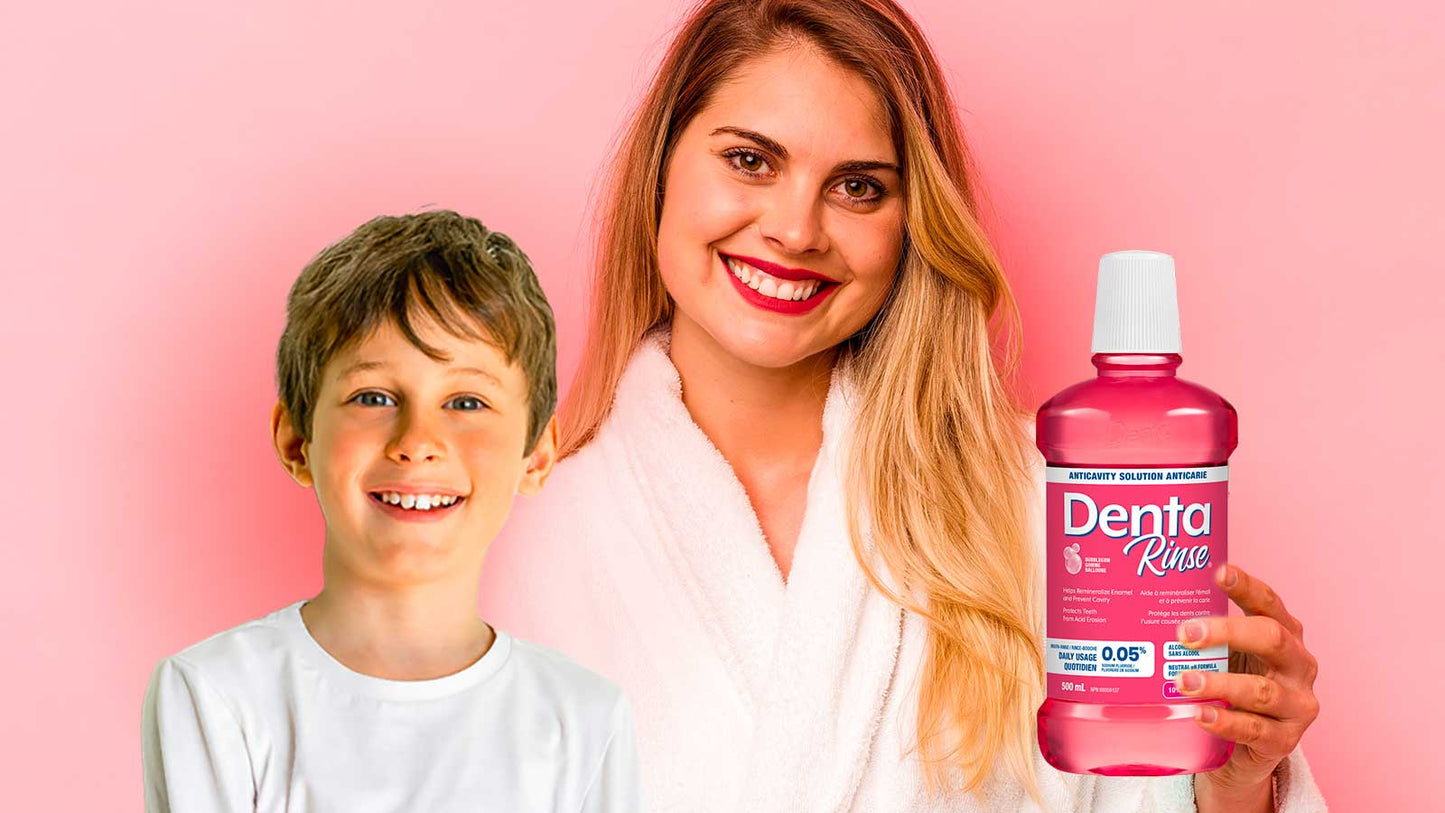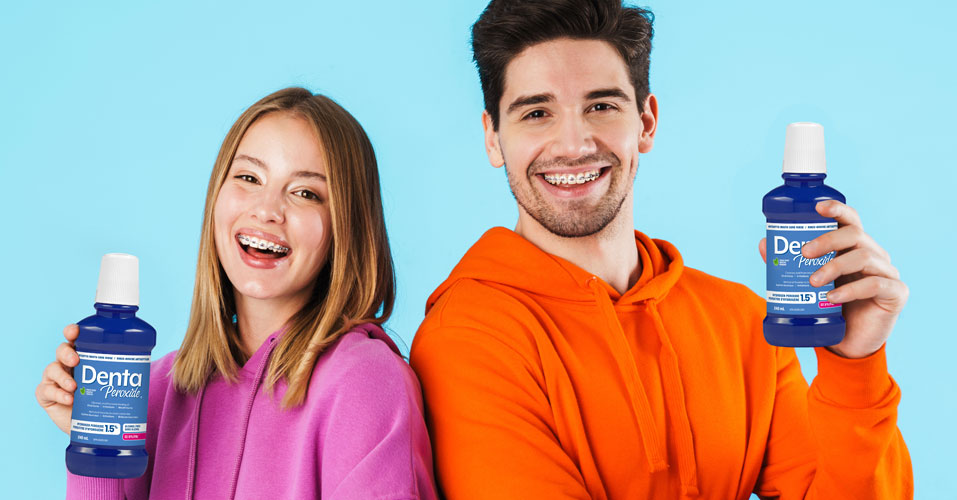FAQ
Here you will find frequently asked questions about our products, as well as some tips for maintaining good oral hygiene.
Normally, your salivary glands produce 500 ml to 1 litre of saliva per day. Dry mouth may be the result of a decrease in saliva production, known as salivary hypofunction.
Xerostomia is when a person reports a sensation of dryness in the mouth (without a specific diagnosis).
In any case, this can lead to a number of unpleasant symptoms, including a sticky, gummy mouth, chapped lips, difficulty eating and swallowing, bad breath, or the need to drink at night.
Dry mouth is mainly caused by medication. More than 500 over-the-counter treatments (e.g., for high blood pressure, allergies, nasal congestion, diuretics) can disrupt saliva production, resulting in dry mouth.
Several health disorders can affect the salivary glands, such as diabetes, Parkinson's disease, Sjörgen's syndrome, and HIV/AIDS.
Treatments such as radiation therapy (for cancer) may also interfere with saliva production, since the salivary glands are particularly sensitive to radiation.
It is important to identify the cause of your condition with a healthcare professional, who will be able to recommend the right treatment for you.
First of all, it is important to know that saliva plays an important role in oral health. Although it is made up of almost 99% water, saliva is necessary for digestion, keeps the mouth well lubricated, and facilitates the cleansing of the mouth.
In fact, it contains calcium, phosphates, and carbonates that help remineralize teeth and maintain a good salivary pH. Your saliva is therefore essential to fight against the risk of cavities and control the presence of harmful bacteria in the mouth.
You are not alone! Approximately 1 in 5 people reports having dry mouth. There are numerous causes for oral dryness, and it can stem from several factors. This explains why around 20% of the population is affected by this condition.
It mostly affects menopausal women and the elderly, as saliva production is altered by certain hormone levels (parathyroid), and advanced age. Consult a healthcare professional to assess your situation and find the appropriate remedy.
The first thing to do is drink plenty of water daily to help keep your mouth well hydrated. Certain foods, beverages, and substances should be avoided, such as coffee, alcohol, tobacco products, and cannabis.
Over-the-counter salivary stimulants are available to promote natural saliva production. The Denta line offers several options to relieve the daily discomfort of dry mouth: Denta Gum, Denta Mint, and Denta Moist spray (These products may not be suitable for you. Always read and follow the label).
Mostly because the outer surface of the enamel of baby teeth is thinner than the enamel of adult teeth. Therefore, young children are at greater risk of developing cavities. A high-sugar diet, snacking, and inadequate daily dental hygiene make young children more vulnerable to cavities. Sugar is transformed into acid, which damages the tooth, much to the delight of cavities.
Before the age of six, many parents tend to believe that cavities are less of a problem because they affect baby teeth. However, left untreated, a decayed baby tooth can infect the tooth below the gum line. This is why children need to develop good oral hygiene as early as possible.
The most important step in the dental care routine is brushing, preferably after each meal. Regular and thorough brushing helps prevent cavities and gum problems.
Mouthwash is also essential to good oral hygiene. It removes food residues in the mouth and attacks the bacteria that can proliferate there (gums, palate, teeth, mouth walls). In addition, it helps reduce the accumulation of plaque and tartar and prevents gingivitis.
It should also be noted that all Denta mouthwashes contain sodium fluoride (also known simply as "fluoride"). This ingredient helps mineralize weak spots in the tooth enamel and prevents the development of cavities. A simple mouthwash can make all the difference and significantly reduce the risk of cavities.
Fluoride is usually used for prevention, as it helps protect teeth from plaque and cavities. However, fluoride also helps to restore enamel. This means that it can slow down the development of a cavity that is already there, for both young patients and adults. Talk to your dentist about it when they see a cavity at a fairly advanced stage.
For optimal and safe use, it is recommended to gargle with mouthwash for about 30 seconds before spitting it out. After rinsing, it is best to wait 30 minutes before eating food.
Some mouthwashes contain alcohol, but they are not generally preferred by oral health professionals. These products are very strong and difficult to keep in the mouth long enough to ensure their full effectiveness. In addition, the alcohol in the product can cause dry mouth and contribute to bad breath.
Aside from these criteria, you should choose a product that has the right taste and strength for you. If you are at risk of developing cavities, mouthwashes with added sodium fluoride (fluoride) are a good option.
All Denta mouthwashes are equally effective. The main differences are in flavour and sodium fluoride concentration. You can choose according to your preferences, for daily or weekly use, and of course according to your dentist's recommendations.
Denta Rinse 0.05% anti-cavity solutions are the ideal choice if you prefer to use a mouthwash every day. For a weekly mouthwash, opt for Denta Rinse 0.2%. In addition to the usual mint flavor, Denta mouthwashes are also available in milder flavors such as grape and bubble gum.
If you're not sure which mouthwash to choose, your dentist will be able to suggest the best option for you.
Many of us will experience a mouth ulcer in our lifetime. Occurring once or twice a year, sometimes monthly, ulcers are a common occurrence. Good dental hygiene helps fight against their apparition, but if that is not enough, an antiseptic solution can be very effective.
Denta Peroxide is an antiseptic mouthwash that cleans and promotes healing of mouth and gum wounds, such as mouth ulcers, accidental bites, minor injuries, and inflammation caused by dental procedures or braces.xid



